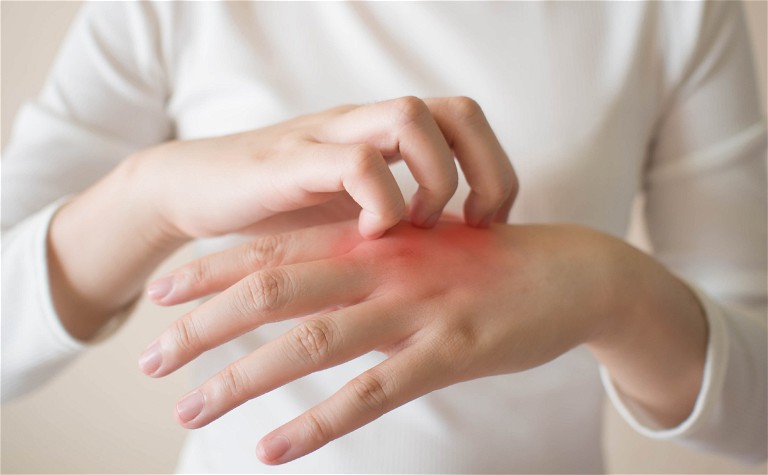ATOPIC DERMATITIS
‘Cumulative life course impairment’: The unforeseen burdens of severe eczema
AbbVie’s Rachael Millward takes a deep dive into dermatitis, patient impact, and patient expectations – and how a healthcare professional might meet them
Pharmafile: What are some of the unexpected complexities of skin conditions such as atopic dermatitis?
Rachael Millward: Atopic dermatitis (AD) is a common chronic inflammatory skin disease with a complex pathogenesis. The severity of the disease varies widely but AD can affect multiple aspects of a patient’s life from the skin manifestations such as the characteristic rash and itching, to less visible impact; such as depression, anxiety, and lack of sleep. AD is what is known as an atopic disease, and is commonly related to other atopic disease such as asthma, allergic rhinitis and in some cases food allergies. Interestingly, Abbvie has conducted a database analysis to further characterise potential comorbidities associated with AD using two distinct databases, CPRD and HES. This analysis has revealed some interesting insights such as observing an increase in the reporting of inflammatory bowel disease as the severity of AD increases. We need to do more research to understand the overlapping immune pathways across the immune mediated diseases to deepen our understanding of such diseases.
AbbVie focuses on dermatological areas with high unmet medical need – which areas within dermatology have you identified on these lines, and why do they qualify?
AbbVie has had long heritage in immunology, but with a dermatology focus for around 20 years. As mentioned AD can have a significant burden on patients lives, added with the complexity of the AD pathogenesis and limited treatment options, there has been a high unmet need for these patients. Some AD patients can be incredibly unwell, with 60% of patients with severe AD talk about their symptoms as unbearable or unrelenting. You can imagine the onward impact of that in terms of things like sleeping, work productivity. For me, focusing on AD and the high unmet need is key and fundamental.
AbbVie also work in delivering treatment areas where current options do not meet patient expectations – can you speak a little on the importance of meeting these expectations, and the current difficulties in delivering on them?
Centrally we need to listen to our patients and understand what they need to do be able to manage their disease. We can assume patients want to be completely free of their disease, however what they actually want could be a good night’s sleep; to wear a dress to go to a wedding or a birthday party; to wake up and feel refreshed and take their kids to school. Small things that can mean a lot to patients. When we look at the patient research we’ve conducted in AD, we often hear patients talk about their desire for freedom from the relentless itching, not being able to sleep, not being able to be productive at work, not being able to concentrate. Patient often talk about feeling embarrassed by their condition, particularly if the rash is on a highly visible areas – on your hands, your face, your legs, skin clearance, for example, could be an ambition we should be aiming towards. At AbbVie, we set out to make a remarkable impact on patients’ lives, and as we innovate and understand immune mediate disease better, we should be asking ourselves: are we meeting the needs of our patients?
What are some of the most serious implications for those who suffer serious chronic skin conditions? How can healthcare professionals work to decrease their severity?
The serious implications are that skin conditions are often dismissed quite early on. One of the biggest barriers for patients, especially for patients with severe skin disease, is being referred to a specialist. Patients can spend a significant period of time in a primary care setting and not receiving the care they require. Sadly some patients may never get to see a specialist, and can drop out of the care system all together, and then we hear of patients self-managing the condition. We need to work in partnership, to allow patients access to a specialist when they need it, and not allow the fact it’s a skin condition to prevent that from happening.
Those patients who do enter into the secondary care system, it’s vital they’re given time with their healthcare professional to talk about how best to manage their conditions as each patient is different and the impact of the disease can vary from patient to patient. Small, but effective, steps, such as educating patients on how to optimise their topical treatments can be vital. For example, patients are often not given any instruction of how much emollient to use on or how much of the affected skin. Simple steps can really help patients gain control of their disease, however time and resource constraints make this difficult in practice.

But, beyond the healthcare system, certainly the symptomatic relief of the condition itself, and always reminding ourselves that some of these patients have been living with this condition for a very long time and have adapted to cope with the condition. When aiming for holistic care, there are many factors that need to be considered, such as the age of the patient, visible signs and symptoms, and emotional wellbeing. It is well documented that AD can have huge psychological impact on patients, but it is not often part of the management plan. Access to psychodermatology clinics for complex patients have demonstrated significant improvements and have provided patients coping mechanisms to support the management of their disease. Unfortunately, this service is not widely available to the patients who need it. Budget cuts have made it particularly hard for departments to offer this valuable service.
We strive to support patients and healthcare stakeholders to access the Future of Better Care, Quicker; focusing on the need to secure better outcomes for patients by working in partnership with healthcare stakeholders.
Between 11-20% of children in the UK suffer from AD, and 2% of these cases are severe. How are AbbVie working to address this long-term condition, and what are its impacts?
AD has quite a high prevalence in adolescents and children and can manifests itself very early in a patient’s life and the effects of AD on children can have lifelong implications. The concept of cumulative life course impairment is interesting, whereby children with AD may not achieve certain milestones when compared to patients of the same age without AD, because of the profound negative impact of the disease. Educating on this concept and managing the disease early and effectively could reduce the overall impact the disease has on children over the long term.
What recent innovations in the treatments of long-term skin conditions have you been particularly excited by?
It is fantastic to see significant investment being made to advance innovation and management of skin diseases in general, there are myriad skin conditions now being investigated and prioritised, many with significant patient burden and with an associated high unmet need, AD is just one of such conditions.
UK-ABBV-211014
December 2021

Rachael Millward is currently head of medical affairs for immunology at AbbVie UK, where the team are working on a wide range of immune mediated inflammatory diseases. Rachael has held various roles, across multiple organisations, ranging from clinical research, pharmacovigilance, medical information, and latterly medical affairs. Rachael’s academic background and research interests are in biotechnology and molecular genetics with a particular focus on pluripotent stem cells. For more information, contact: UKMediaRelations@abbvie.com